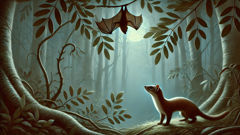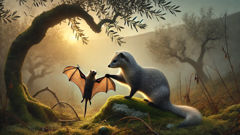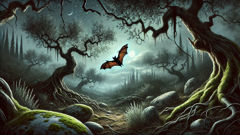Introduction
In the hush of ancient Greek forests, where the olive trees lean towards the stars and wild thyme blankets the undergrowth, every creature carves its existence from the caprices of nature. It is a land of gods and heroes, yet just as much a realm of sly foxes, wise owls, and the quiet flutter of wings at dusk. The night in these woodlands is alive with secrets; the trees whisper old tales as the wind slips through their branches, and the moonlight pools silver across mossy stones. Here, beneath the shadowed canopy, survival isn’t simply a matter of tooth and claw—it’s an art. And in the heart of these woods, a small bat named Myrrhine knows this truth better than most. Myrrhine is neither the strongest nor the swiftest in the forest. She is a creature of delicate bones, fur the color of dusk, and eyes keen to the faintest flicker of movement. By day, she clings in silence to a hidden nook in the limestone cliffs, but by night, she swoops and darts, threading between branches with silent precision. To the untrained eye, she is just one more denizen of the night. Yet, within her small chest beats a heart both courageous and astonishingly quick-witted—a heart that will soon be tested by dangers more cunning than the talons of any owl or the hunger of any fox. The old tales say that wisdom is the rarest treasure in a wild world. Some gain it through years, others in a single night of peril. For Myrrhine, wisdom arrives on wings of desperation, in the form of two weasels whose hunger is matched only by their suspicion. As the first faint blush of dawn stains the sky, Myrrhine finds herself ensnared by fate, forced to answer the oldest riddle: survive, or perish. What follows is the story of how she saved her life not once, but twice—proving that cleverness, when paired with courage, can illuminate even the darkest corners of the wild.
A Night of Peril: Myrrhine’s First Encounter
As dusk spills across the Peloponnesian hills, the forest trembles with anticipation. Myrrhine emerges from her limestone roost, stretching fragile wings, her senses alive to the chill air and the scent of flowering herbs. Tonight, the world feels different—charged with a stillness that prickles along her fur. Hunger stirs in her belly, but caution tugs at her heart. For even the smallest misstep in this ancient woodland can invite disaster. With a silent leap, she joins the twilight throng: moths spinning in drowsy circles, fireflies winking between reeds, and beetles clicking their secret rhythms. Myrrhine darts through a tunnel of laurels, feasting on the bounty of the night, until a sharp scent halts her in midair. It’s musky, familiar, edged with menace—a weasel on the hunt. She veers, but not fast enough. In a flash of white teeth and russet fur, a weasel lunges from the undergrowth and pins her gently, yet firmly, between his nimble paws.

The weasel’s eyes gleam in the half-light. He’s slender and quick, every muscle taut with suspicion. "So, what have we here?" he purrs, his nose quivering as he inspects his trembling captive. "A bird, flitting where it oughtn’t. Did you think the night would hide you from me?"
Myrrhine’s mind races. She knows well the reputation of weasels: they despise birds, blaming them for raids on their burrows and the loss of precious eggs. To be a bird in a weasel’s claws is to be doomed. But Myrrhine is no ordinary prey. With a breath to steady herself, she speaks in a voice both meek and clear, "Kind weasel, you are mistaken—I am no bird. See my wings? They are thin as parchment, nothing like the broad feathers of your enemies. Listen to my song: no chirp or tweet, only the soft click of my tongue. I eat no eggs, nor do I raid nests. My hunger is for insects alone."
The weasel narrows his eyes, scrutinizing her face and the delicate membrane of her wings. Myrrhine forces herself to remain still, even as fear claws at her insides. She knows that truth alone may not save her; she must become what the weasel most wishes to spare.
"Indeed," she continues, "the birds you despise are creatures of day, garish and loud. I belong to the night—a humble hunter who keeps your burrows free of biting flies and crawling beetles. Release me, and I shall be your ally, not your rival."
The weasel pauses, caught between hunger and doubt. At last, he huffs and withdraws his claws. "If you are no bird, then you are of little concern to me. Go, night-flitter, and keep to your shadows."
Myrrhine barely dares to believe her fortune as she slips free and vanishes into the deepening dusk. Her heart pounds with relief, but she knows danger is never far in these woods. The weasel’s warning lingers: trust is scarce, and survival often depends on how well one can adapt.
Between Dusk and Dawn: Myrrhine Faces a Second Test
Myrrhine flees through a maze of shadows, adrenaline propelling her deeper into unfamiliar territory. The forest grows denser, thickets bramble at her wingtips, and the scent of damp earth fills her senses. Yet before she can find safety, disaster strikes again. From beneath a pile of stones leaps another weasel—larger, older, and hungrier than the first. His fur is streaked with gray, and his eyes burn with an intelligence that chills Myrrhine to her core. She’s barely caught her breath before she is trapped once more, pinned gently but unyieldingly by another set of claws.

This weasel is shrewder, less eager to believe in words or appearances. "Aha," he hisses, "another careless bird, caught where it doesn’t belong. You feathered fools think you own the night?"
Myrrhine’s mind spins. She recalls the first weasel’s hatred for birds, but senses something different here. The old stories she has learned whisper that some weasels despise not birds, but mice and all creatures of fur and shadow. In this crucial moment, Myrrhine must reshape herself yet again, drawing on everything she knows about her would-be predator.
"Please, wise one," she pleads, shifting her tone to sound small and timid. "I am not a mouse or a rat—I am a bird, though a humble one. See my wings? No fur, no whiskers. I eat no grain nor nibble at roots. I take nothing from your burrows or stores."
The weasel frowns. "A bird, are you? Yet you lack feathers and your wings are bare."
Myrrhine bows her head. "I am the poorest of birds, it’s true. But I soar in darkness to escape your enemies—the rodents who raid your dens. Let me live, and I shall fly above them, warning you when danger nears."
The old weasel hesitates. Hunger gnaws at his belly, but so too does suspicion. He studies Myrrhine’s trembling form, searching for any sign of deception. Myrrhine holds her breath, keeping her wings spread wide to hide her tiny claws and furless body.
Moments drag on. In the hush of the forest, even the breeze seems to wait. At last, the weasel sighs and releases her. "Go, then. But keep away from my stones and burrows."
Myrrhine darts into the pre-dawn gloom, her heart pounding with relief and awe. Twice in one night she has faced death—and twice she has survived by embracing whatever role the moment demanded. The forest, so full of peril, has taught her its greatest secret: sometimes, wisdom is not just knowing who you are, but knowing how to become what others need to see.
Conclusion
As sunlight creeps through olive branches and the world stirs awake, Myrrhine finds a quiet hollow where she can rest at last. The forest is peaceful now—her trials of the night transformed into lessons she will carry forever. She knows she cannot change what she is: not fully bird, not wholly beast, but something in between. Yet in a realm ruled by instinct and suspicion, her survival depends not on her wings alone, but on her mind. For Myrrhine has learned that wisdom is not a fixed thing—it is fluid, shaped by need and circumstance. In every encounter, she adapted, turning danger into opportunity by understanding the fears and desires of those who held her fate in their paws. The woods remain wild and unpredictable, but Myrrhine is no longer just a silent shadow beneath the moon. She is a symbol of cleverness—the quiet power that belongs to those who listen, who observe, and who are brave enough to become what the moment requires. In ancient Greece, this fable became a lantern passed from parent to child, teacher to student. Its glow reminds us even now: when the world turns hostile and survival hangs in the balance, wit can be sharper than claws, and wisdom can light a path through the darkest night.













